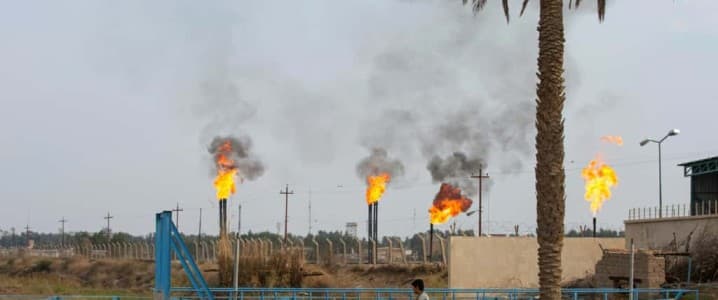In a significant setback for Iraq’s efforts to address its ongoing energy crisis, the United States has blocked a proposed natural gas import deal that would have routed supplies from Turkmenistan through Iran. This decision, rooted in Washington’s stringent sanctions against Tehran, underscores the geopolitical tensions influencing global energy markets and leaves Iraq scrambling for alternative solutions to its chronic power shortages.
Background of the Deal
The agreement in question, first proposed in 2023, involved a swap arrangement where Turkmenistan would supply natural gas to Iraq via Iran’s National Iranian Gas Company (NIGC). Under the terms, Iran would facilitate the transit of the gas and retain up to 23% of the daily volume for its domestic needs, without any monetary exchange involved.
This setup was designed to help Iraq diversify its energy sources beyond its heavy reliance on Iranian imports, which have been a point of vulnerability due to fluctuating relations and external pressures.Iraq, which suffers from frequent electricity blackouts, especially during peak summer demand, aimed to use the imported gas to fuel its power plants. The deal was seen as a critical step toward energy independence, but it required U.S. approval because of the involvement of Iran and the potential implications for international sanctions compliance.
Volume of Natural Gas Involved
The blocked deal would have provided Iraq with approximately 5.025 billion cubic meters (bcm) of natural gas annually.
This volume represents a substantial portion of Iraq’s gas needs for electricity generation, potentially powering thousands of megawatts and alleviating shortages that affect millions of citizens. Earlier reports on similar arrangements mentioned daily supplies of up to 20 million cubic meters, which aligns roughly with an annual figure of around 7.3 bcm if scaled up, though the specific blocked deal focused on the 5.025 bcm net to Iraq after Iran’s share.
Dollar Volumes and Economic ImpactWhile exact contractual pricing details were not publicly disclosed in the context of the blockage, estimates from related negotiations suggest the gas could have been valued at no less than $300 per 1,000 cubic meters.
Based on this benchmark, the annual value of the 5.025 bcm supply to Iraq would equate to approximately $1.5 billion. This figure accounts for the net volume after Iran’s retention and highlights the economic stakes involved. The deal’s collapse not only deprives Iraq of this energy resource but also represents a lost opportunity for Turkmenistan to expand its export markets, potentially worth billions over the contract’s duration.
Broader reports on Turkmen-Iran-Iraq gas swaps have referenced total volumes up to 10 bcm annually in some configurations, which could push the overall deal value closer to $3 billion if priced similarly.
However, the specific arrangement vetoed by the U.S. centered on the lower net figure for Iraq.
White House Rationale for Blocking the Deal
The U.S. decision stems from its long-standing “maximum pressure” campaign against Iran, aimed at curbing Tehran’s nuclear ambitions, ballistic missile programs, and support for regional proxies.
A U.S. source familiar with the matter stated that the Trump administration would not support any arrangements that benefit Iran, emphasizing that while the U.S. is committed to assisting Iraq with its energy needs, it cannot endorse deals that indirectly aid sanctioned entities.
This stance aligns with earlier actions, such as the termination of sanctions waivers in March 2025, which had previously allowed Iraq to import electricity and gas directly from Iran.
The White House has not issued a formal public statement specifically on this September blockage, but the move is consistent with broader policy directives from the U.S. Treasury and State Department, which have intensified sanctions enforcement against Iranian oil and gas networks.
Concerns over potential exposure of Iraqi banks to secondary U.S. sanctions also played a role, as proceeding without approval could have triggered financial penalties.
Iraq attempted to mitigate these issues by proposing third-party international monitoring to ensure compliance with U.S. sanctions and anti-money laundering regulations, but these efforts were unsuccessful.
The U.S. Treasury declined to comment further on the matter, maintaining a focus on disrupting Iran’s evasion of sanctions through regional partnerships.
Are you Paying High Taxes in New Jersey, New York, or California?
Implications for Regional Energy Dynamics
This blockage exacerbates Iraq’s energy woes at a time when demand is soaring due to population growth and extreme weather. Baghdad now faces the challenge of sourcing alternatives, possibly from domestic fields or other neighbors like Qatar or the Kurdistan region, though these options come with their own logistical and political hurdles.On a broader scale, the decision highlights how U.S. foreign policy continues to shape energy flows in the Middle East, potentially straining alliances and pushing countries like Iraq toward greater self-reliance or riskier partnerships. As global natural gas markets remain volatile, with prices influenced by conflicts and supply disruptions, the fallout from this veto could have ripple effects on regional stability and international trade.
Energy News Beat will continue to monitor developments in this story as Iraq seeks new pathways to secure its energy future.
Avoid Paying Taxes in 2025
Crude Oil, LNG, Jet Fuel price quote
ENB Top News
ENB
Energy Dashboard
ENB Podcast
ENB Substack

